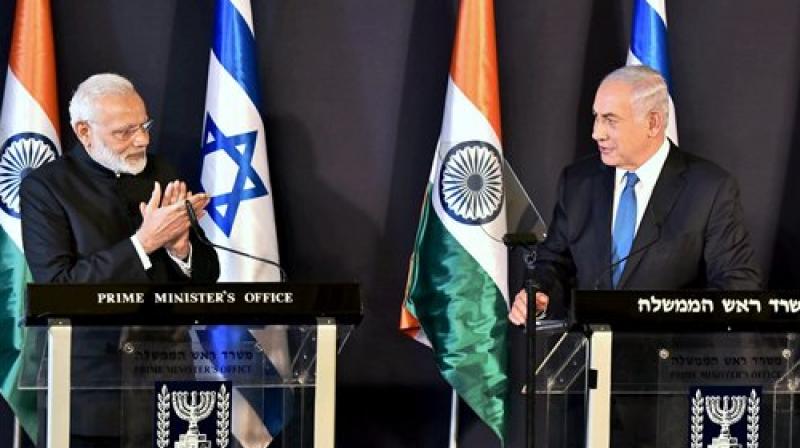India, Israel now strategic partners; vow to do more against growing terrorism
After the wide-ranging talks, the two sides signed seven pacts covering areas like innovation, water conservation, agriculture and space.

Jerusalem: India and Israel on Wednesday elevated their ties to the strategic partnership level, vowing to do "much more together" to combat growing radicalisation and terrorism while pitching for strong action against those financing and providing sanctuaries to terror groups.
The issue of terror and "strategic threats" along with various other topics like cooperation in defence and security, water, agriculture, space and West Asia figured prominently in the talks between Prime Minister Narendra Modi and his Israeli counterpart Benjamin Netanyahu in Jerusalem on Wednesday.
After the wide-ranging talks, the two sides signed seven pacts covering areas like innovation, water conservation, agriculture and space.
During the second of his three-day visit, Modi also met Moshe Holtzberg, the Israeli child who narrowly escaped death in the 2008 Mumbai terror attack.
"This is a good day... You and I can change the world...Our relationship is made in heaven and we are doing the implementation part," Netanyahu said with Modi standing by his side during a joint media appearance.
The Israeli prime minister, who is devoting full time to Modi during his three-day visit and joining him at all his engagements, said the two countries together "can make a big difference" to the world.
Modi, while describing his stay in Israel so far as "productive" and "memorable", said, "Our goal is to build a relationship that reflects our shared priorities and draws on enduring bonds between our peoples.
The first Indian prime minister to visit Israel said both the countries live in "complex geographies" and are aware of "strategic threats" to regional peace and stability.
"India has suffered first-hand the violence and hatred spread by terror. So has Israel," he said, adding the two leaders had "agreed to do much more together to protect our strategic interests and also cooperate to combat growing radicalization and terrorism, including in cyber space."
Netanyahu said the two countries need to cooperate in the field of counter-terrorism as he described 26/11 as a "horrible terrorist attack".
Foreign Secretary S Jaishankar, while briefing the media on the talks later, said the two countries had decided to elevate their relationship to the strategic partnership, which gives a special dimension to the ties.
A joint statement issued after the talks said "strong measures should be taken against terrorists, terror organisations, their networks and all those who encourage, support and finance terrorism, or provide sanctury to terrorists and terror groups."
Though nobody was named in this context, the Indian side saw this as a reference to Pakistan.
"There are a lot of common challenges, including cyber security," the foreign secretary said, adding, "There is an ongoing dialogue on homeland security (between India and Israel). This is expected to be strengthened."
The joint statement said two prime ministers recognised that terrorism poses a grave threat to global peace and stability and reiterated their strong commitment to combat it in all its forms and manifestations.
"They stressed that there can be no justification for acts of terror on any grounds whatsoever," it said.
Modi and Netanyahu asserted that fight against terror won't succeed if it is segmented, Jaishankar said.
Both leaders also committed to cooperate for the early adoption of the Comprehensive Convention on International terrorism (CCIT), the statement added.
The foreign secretary was asked why there was no action like the one witnessed during Modi's recent visit to Washington when the US had declared Pakistan-based Hizbul Mujahideen chief Syed Salahuddin as a 'global terrorist' recently.
Responding, he said the American sanctioning system is unique and cannot be used as a "norm". "No other country has the policy or legal institution to do it (sanction)... The US is an exception," he added.
Referring to areas of defence and security, Jaishankar said India and Israel have been having "time-tested" and long-standing partnership on defence, joint development and transfer of technology.
The foreign secretary said Israel is excited about the 'Make-in-India' programme and wants to "Make-with-India'.
"There is appetite for working with us. There is a lot of enthusiasm, there are a lot of possibilities," he said. The two sides signed seven agreements, including in areas like space, agriculture and water conservation.
Jaishankar said the pact in the field of agriculture is crucial for India to meet its ambitious goal of doubling the farmers' income by 2022.
Modi and Netanyahu also discussed the situation in West Asia and the wider region. "It is India's hope that peace, dialogue, and restraint will prevail," Modi said.
India and Israel also agreed to set up a USD 40 million fund for industrial Research and Development, and innovation fund, with both countries contributing USD 20 million each.
Jaishankar said Modi and Netanyahu also discussed visa liberalisation.
India invited Israel to be a partner country in the annual Technology Summit.
Modi also invited Netanyahu and his family to pay a visit to India.

